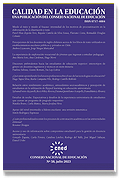Relationship Between Academic Performance, Socio-Academic Background, and Student Perception of Flipped Learning in University Education
DOI:
https://doi.org/10.31619/caledu.n58.1244Keywords:
Flipped Learning, higher education, pedagogical innovation, student background, reflection on teachingAbstract
This study aimed to explore the potential relationship between academic performance, socio-academic background, and student perception of the Flipped Learning (FL) pedagogical strategy over a five-year period in a health related subject. The goal was to identify the actual benefits of FL in university education. A total of 385 students participated in this longitudinal study, with 77.7% having prior experience with FL. It was observed that students with a higher grade in secondary education and with economic benefits approved in a higher percentage, while students from private schools presented a higher failure rate in the same subject. In addition, a direct association between positive perception and approval was observed in higher courses, but not in freshmen years , where the use of FL did not have the expected effects. By comparing student performance, academic background, socioeconomic conditions, and perception, it was concluded that FL is effective for higher-level students but not for those in initial courses. These findings prompt reflection on the significance of context in implementing pedagogical innovations and highlight the need for further research in university education.
Downloads
Published
Issue
Section
License
Copyright (c) 2023 Calidad en la Educación

This work is licensed under a Creative Commons Attribution 4.0 International License.
Authors retain their Copyright and only transfer a part of these to the journal, accepting the following conditions:
Authors keep their rights as authors and guarantee the right to the journal for the first publication of their work, which is simultaneously subject to the Creative Commons Attribution license allowing third parties to share the study accrediting the author and first publication in this journal.
Authors may adopt other non-exclusive license agreements for distribution of the version of the published work (e.g. inclusion in an institutional thematic file or publication in a monographic volume) accrediting initial publication in this journal.
Authors are allowed and recommended to share their work over the Internet (e.g. in institutional telematic files or their website) before and during the submission process, which may lead to interesting exchanges and increased citation of the published work. (See The effect of open access).

